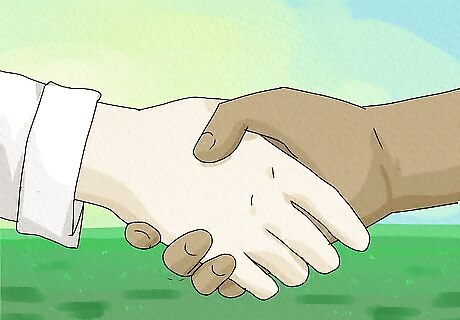
views
- Your partner might be doing the bare minimum to keep you around if there’s not a lot of romance or passion between you two.
- Your partner might also be doing the bare minimum if you feel like you have to ask for their affection.
- Look for a relationship that provides a sense of security and openness as your bare minimum standards.
Signs Your Partner is Doing the Bare Minimum

They do just enough to keep you around. In a relationship, the “bare minimum” is one step above absolutely nothing. When someone’s just doing the bare minimum, you don’t necessarily notice that anything’s wrong, but there’s not a lot to brag about, either. You might feel okay in the relationship, but you just wish your partner would do a little bit more to make you feel special. Your partner probably won’t cheat on you or make you feel bad—but it’s important to ask yourself if they actually make you feel good.

They’re not emotionally invested in the relationship. Do you feel like you’re doing all the emotional heavy lifting? All the bonding and deep conversations come from your end, while your partner is totally cool with keeping things surface-level. While it’s possible that they’re just not comfortable opening up to you yet, there’s also a chance that they’re keeping you at arm’s length on purpose. They might even tell you that it’s okay if you want to date other people, even when you’ve made it clear you want to be exclusive.

There’s no romance or passion in your relationship. Does your partner take you out on dates? Do they plan romantic evenings for you two to spend one-on-one time together? If the answer is no and no, it’s likely that they are just doing the bare minimum to keep you around. If you’ve brought this up before, you might notice that your partner changes their ways for a little while, but then eventually returns to their old habits.

You feel like you have to beg for love or affection. In a healthy relationship, you should never feel like you’re begging for anything. Love, affection, and support should come naturally. If your partner makes you feel bad for asking that your emotional needs are met, it’s a sign that they don’t want to put in the effort to make this relationship work. For instance, maybe you tell your partner that for your birthday, you’d really like a bouquet of flowers. When your birthday comes around, they’ll say that they “forgot” or didn’t get to it in time.
Bare Minimum Standards for a Healthy Relationship

Healthy communication The foundation to building a healthy relationship is always open and honest communication. Make sure that you and your partner are on the same page, and you two can talk to each other about anything and everything. Good communication ensures that you’ll have fewer disagreements and misunderstandings. Try not to assume what your partner means when they tell you things. If you aren’t 100% clear on what’s being said or asked of you, clarify it with your partner. Say something like, “So I’m hearing you say…” or, “Could you explain what you meant by that?”

Friendship Your partner is your partner, but are they your friend, too? You two should be able to hang out, have fun, and laugh with each other. Romance and passion are important, but friendship is what makes relationships last.

Exclusivity If you two are in a monogamous relationship, the bare minimum is staying faithful to each other. Be sure to define the relationship so you’re both on the same page, then stay exclusive to each other. If you two are just casually dating, it’s even more important to talk about what that means for both of you. Does “casual” mean that it’s okay to date other people, or is it a monogamous relationship without the labels?

Mutual respect Respect means that you both value each other and won’t cross each other’s boundaries. It also means that you take your partner’s feelings and wishes into account when you make decisions. For instance, an example of disrespect in a relationship might be flirting with other people. Even though you’re “technically” not cheating, it’s still not very respectful to flirt with others while in a relationship.

Trust Can you trust your partner 100%? Can you be open and honest with each other about everything? Trust is another pillar in a healthy relationship, and it’s important to trust your partner so you can give them the benefit of the doubt. If you and your partner don’t have a solid foundation of trust in the relationship, consider going to couple’s counseling. Trust can be hard to re-establish once it’s gone, and a professional can help.

Individuality Although you’re in a relationship, it’s important to keep your own friends and hobbies, too. You shouldn’t be expected to hang out with your partner 24/7, so make sure you both get alone time as well. A partner who wants to hang out with you all the time is showing controlling behavior, which can lead to abusive tendencies down the line.

Clear boundaries Talk about your boundaries with each other so you’re both on the same page. These could be about the relationship (no flirting with other people, no getting numbers from others), sex (which sex acts are on or off the table), or even how you two fight (no name-calling or yelling). Try to respect your partner’s boundaries, and make sure they respect yours as well.

Healthy sexual relationship While sex definitely isn’t the most important part of a relationship, many people find that a healthy sex life improves the relationship as a whole. Talk to your partner about what a good sex life looks like for the both of you, then do your best to make yourself and your partner happy. It’s important to talk about the frequency of sex throughout the week, too. People’s libidos are different, and you may have to compromise with your partner about how often you two have sex.

Safety Overall, you should feel safe and cared for with your partner. Your partner should never force you to do or say things that make you feel uncomfortable, and you should feel able to speak your mind and assert your own boundaries. If you feel unsafe in a relationship, it’s possible that the relationship is abusive. If that’s the case, make a plan to leave the relationship right away.
How do you ask for more in a relationship?

Tell your partner exactly what you need from them. If your emotional needs aren’t being met, sit down with your partner and have a talk. In clear, concise language, let your partner know exactly what you’ve been feeling and how they could improve within the relationship. Don’t aim to make them feel bad—just let them know what needs to change. “I’d really appreciate it if you put more effort into planning dates for us. It really makes me feel good when you take me out, and it makes me happy to see that you put thought into an outing.” “Hey, could we talk? I wanted to see if we could chat about where this relationship is going. We don’t have to label anything yet, but I need to know if this is serious or if we’re still just casually dating.”

Focus on what you want, not your partner’s shortcomings. It’s natural for your partner to feel defensive in a conversation like this. Use “I” language to put the focus back onto you and your needs rather than how your partner hasn’t been living up to them. “When I come home to a bouquet of flowers, it makes me feel really good. I’d like to feel that way more often.” “When we don’t go out on actual dates, I feel a little bit neglected.”

Be vulnerable with your partner. Let your partner know that this is coming from a place of vulnerability, and it’s not an attack. The more open and honest you are with your partner, the more likely they are to hear you out and really take steps to change their behavior. “This isn’t easy for me to say, because I really like how our relationship is going. I just think there needs to be some changes if we’re going to do this long-term.” “I know you’ve been totally honest with me, so I want to be totally honest with you.”
















Comments
0 comment